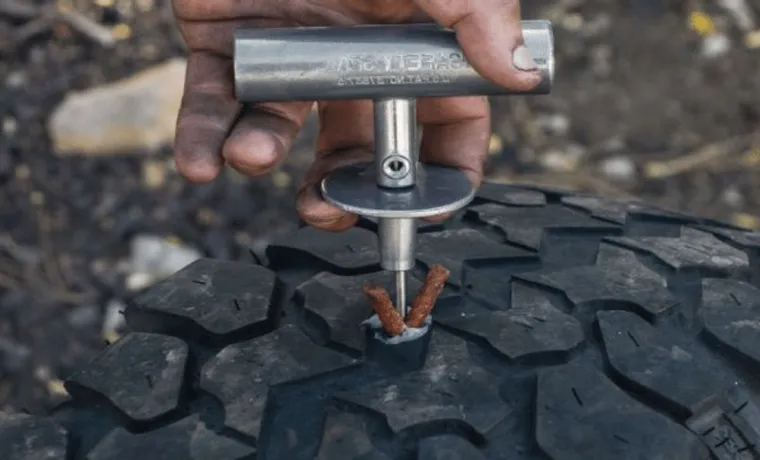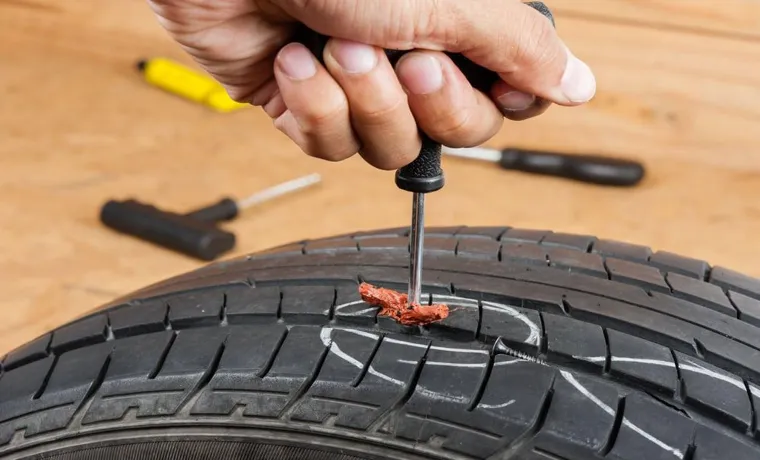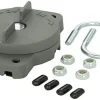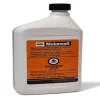Are you wondering how long a tire plug can last? When you get a puncture in your tire, it can be a hassle to get it repaired, especially when you have to spend money on new tires. So, a quick and easy solution is to use a tire plug. However, the longevity of a tire plug is a concern for many drivers.
A tire plug is a quick fix for a puncture, but how long does it really last? Well, the answer is that it depends on several factors. Firstly, the quality of the tire plug matters a lot. It is crucial to use a high-quality tire plug that can withstand sudden impacts and pressure.
Secondly, the size and location of the puncture can determine the durability of the fix. Generally, a tire plug can last for about six to twelve months, or even longer if installed correctly. However, it is important to keep in mind that a tire plug is not a permanent solution, and it is crucial to have your tire properly inspected by a professional after using a plug.
To sum up, using a tire plug can save you time and money, but it is not a long-term solution. Remember to use high-quality plugs and have your tire inspected by a professional after using it. By doing so, you can ensure that your tire remains safe and roadworthy for a longer period.
Table of Contents
Introduction
If you’ve ever had a punctured tire, you know how frustrating it can be – especially if you have places to be. That’s why tire plugs are a great solution to fix the problem quickly and affordably. But, how long do tire plugs last? The answer depends on the type of plug used, and the conditions under which it is driven.
In general, most tire plugs last anywhere from six months to one year. However, if the puncture is near the edge of the tread or sidewall, the plug may not last long. Additionally, if you drive on rough roads or in extreme temperatures, the plug may wear out faster, and you might need to replace it sooner.
To ensure your safety and prevent further damage to your tire, it’s best to have the puncture inspected by a professional and replaced if necessary. Overall, tire plugs are a great temporary fix, but they are not meant to last forever.
Explanation of tire plugs
When it comes to fixing a flat tire, people often wonder about the effectiveness of tire plugs. Tire plugs are essentially small puncture-repairing devices that can seal small holes in the tire, allowing you to continue your journey without having to replace the entire tire. The plugs work by being inserted into the hole and expanding to create a tight seal, preventing air from escaping.
One of the benefits of tire plugs is that they are relatively cheap, and the process of using them is straightforward, even if you’re not a professional mechanic. However, it’s crucial to note that tire plugs are not a long-term solution for a punctured tire and should only be used in emergency situations. If you encounter a flat tire, it’s better to take your vehicle to a professional tire repair shop to determine the extent of the damage and avoid any safety hazards.

Importance of knowing their lifespan
As a pet owner, it is important to know the lifespan of your furry friend. Understanding your pet’s lifespan can help you provide them with the necessary care and attention throughout their life. It can also prepare you for the inevitable end of their life.
Knowing their lifespan can help you plan for their future expenses, such as medical bills or dietary needs. One of the main benefits of knowing your pet’s lifespan is being able to determine the right time for certain milestones, such as when to spay or neuter them. This can have a significant impact on their health and well-being.
Therefore, it is important to research the lifespan of your pet and take the necessary steps to ensure they live a happy and healthy life.
Factors That Affect the Lifespan of Tire Plugs
When you get a tire puncture, a temporary fix is to use a tire plug. However, it’s important to know that tire plugs don’t last forever. The lifespan of a tire plug can vary depending on a few key factors.
One of the most important factors is the location of the puncture. If the puncture is in the center of the tread, the plug is likely to last longer because there is less stress on the plug. But if the puncture is on the sidewall or shoulder, the plug may not last as long because those areas of the tire experience more stress and flexing.
Another factor that affects the lifespan of a tire plug is the quality of the plug itself. If you use a high-quality tire plug and follow proper installation procedures, the plug may last several years. However, if you use a low-quality plug or don’t install it properly, it may fail sooner.
Finally, factors like temperature, driving habits, and the type of terrain you drive on can all affect how long a tire plug lasts. So, while a tire plug can be a quick and easy solution to a punctured tire, it’s important to keep in mind that it is not always a long-term fix.
Size and location of the puncture
Tire plug When it comes to the lifespan of tire plugs, there are several factors that can affect how long they will last. One of the most important factors is the size of the puncture that the plug is meant to repair. If the hole is too large or the puncture is located in the sidewall of the tire, chances are the plug will not hold up for long and will require a professional repair or even replacement.
Additionally, if the puncture is too close to the edge of the tire, the plug may not be able to seal properly, leading to air leaks and ultimately a flat tire. Another factor to consider is the type of driving conditions the tire is exposed to. Plugs may not hold up as well in extreme temperatures or on rough terrain, so it’s important to take these factors into account when deciding whether to rely on a plug or opt for a professional repair.
Overall, while tire plugs can be a convenient and affordable solution for puncture repairs, it’s important to consider all of these factors in order to ensure their effectiveness and longevity.
Type of plug material used
When it comes to the lifespan of tire plugs, the type of plug material used is a key factor. Different materials will have different levels of durability and longevity, and choosing the right material can have a significant impact on how long your tire plug will last. For example, plugs made from high-quality rubber are often more durable and longer-lasting than those made from lower-quality materials.
Additionally, plugs made from synthetic materials like silicone or polyurethane may also be more durable and long-lasting. Ultimately, the type of plug material used will depend on a number of factors, including the specific needs of your vehicle as well as your budget. By selecting the right material for your tire plug, you can help ensure that your tires remain in good working condition and that you stay safe on the road.
Driving habits
When it comes to maintaining the lifespan of tire plugs, there are a number of factors to consider. One of the most important is your driving habits. If you frequently drive on rough terrain or over potholes, your tire plugs are more likely to wear out faster than if you mainly stick to smooth roads.
Additionally, if you frequently drive at high speeds or make sudden stops, this can also take a toll on your tire plugs. It’s important to be mindful of your driving habits and do what you can to minimize wear and tear on your tires. By doing so, you can ensure that your tire plugs last for as long as possible and keep you safe on the road.
So, the next time you hit the road, keep in mind that your driving habits can have a big impact on the lifespan of your tire plugs.
Road conditions and weather
When it comes to maintaining the lifespan of tire plugs, there are several factors that come into play. One of the most significant factors is the road conditions on which you are driving. Rough roads, potholes, and debris can all cause wear and tear on your tires, causing your tire plugs to become compromised.
Harsh weather conditions also play a role in the lifespan of tire plugs. Extreme temperatures, rainstorms, and snow can all cause the plug to weaken and possibly fail altogether. Additionally, factors such as your driving style, the frequency of driving, and the quality of the tire plug itself can all affect how long it will last.
By regularly inspecting your tire plugs and taking note of any signs of damage, you can ensure that your tires are safe and reliable on the road. Stay vigilant and stay safe!
Average Lifespan of Tire Plugs
“How long do tire plugs last?” is a common question that many drivers ask when they experience a punctured tire. Tire plugs are a quick and easy fix for small punctures, but many people are not sure how long they will last. The average lifespan of a tire plug is about one year, but it can vary depending on how often you drive and the conditions in which you drive.
Over time, the rubber on the plug can wear down, and it may lose its ability to seal the puncture. Additionally, if you regularly drive on rough terrain or in extreme weather conditions, the plug may become damaged or dislodged more quickly. It is important to keep an eye on your tire plugs to ensure they are still providing a reliable seal.
If you notice any signs of damage or wear, it is best to replace the tire plug as soon as possible to avoid a potential blowout or flat tire.
Data on how long tire plugs last on average
When it comes to tire repairs, many people wonder how long tire plugs typically last. The average lifespan of a tire plug greatly depends on various factors such as the type of plug, the size and location of the puncture, and the type of tire it’s used on. However, on average, tire plugs can last anywhere from 2-7 years.
It’s important to note that while a tire plug may seem like a quick and easy fix, they do not provide a permanent solution and should only be used as a temporary fix until the tire can be replaced or professionally repaired. As a general rule, it’s always best to have a tire puncture properly repaired by a certified technician to ensure your safety on the road.
When to Replace Tire Plugs
As a driver, you might find yourself in situations where you need a tire plug to quickly patch up a punctured tire. While tire plugs are a cheap and convenient fix, it’s important to keep in mind that they’re not a permanent solution. In general, tire plugs can last anywhere from a few months to a couple of years, depending on factors such as the severity of the puncture, the quality of the plug, and the type of tire.
It’s always a good idea to inspect your tire plugs regularly, looking for signs of wear and tear such as cracking or tearing. If you notice any of these signs, or if you start experiencing a loss of air pressure, it’s likely time to replace your tire plug. Remember, tire plugs are meant to be temporary fixes, and eventually, you’ll need to replace your tire altogether to ensure your safety on the road.
Signs that indicate it is time to replace tire plugs
Tire Plugs Tire plugs are essential for patching up small punctures in your tires, but they do have a lifespan. So, how do you know when it’s time to replace them? One tell-tale sign is if you can see any visible cracks or tears on the surface of the plug. These are indications that the plug has deteriorated due to wear and tear, or exposure to the elements, and is no longer providing an effective seal.
Another sign is air leakage. If you have to add air to your tire more frequently than usual, it may be a sign that the plug has become detached or damaged. It’s important to replace the tire plug as soon as possible to prevent further damage to the tire.
Remember, tire plugs are a temporary fix, and it’s always recommended to get your tire inspected by a professional if you notice any signs of damage. By following these simple tips, you can ensure that your tires are in top shape, giving you better performance and safety on the road.
Conclusion and Recommendations
In the immortal words of Forrest Gump, tire plugs are like a box of chocolates – you never know how long they will last. While some plugs may hold up for years, others might give out after just a few weeks. Factors such as the size and location of the puncture, the quality of the plug, and driving conditions all play a role in determining the lifespan of a tire plug.
So, if you find yourself with a flat tire that needs a plug, keep your fingers crossed and hope for the best – or better yet, invest in a spare tire!”
FAQs
What is a tire plug and how does it work in fixing a flat tire?
A tire plug is a small, rubbery plug that is inserted into the puncture of a tire. It works by sealing the hole and preventing air from escaping.
Can a tire plug last forever?
No, a tire plug is meant to be a temporary fix and should be replaced by a permanent solution like a patch or replacement tire as soon as possible.
How long can a tire plug last before needing to be replaced?
A tire plug can last up to six months to a year, depending on driving conditions and the size and location of the puncture. It’s important to regularly check the tire to ensure the plug is still holding up.
Can a tire plug be used for any type of tire?
No, tire plugs are only meant for repairing small punctures in passenger car tires. They should not be used for larger punctures or on larger vehicles like trucks and SUVs.
Are there any risks to using a tire plug?
While a tire plug can be a quick fix for a flat tire, there are risks associated with using them. Tire plugs can cause the tire to become unbalanced, leading to uneven wear and potentially dangerous driving conditions.
How much does it cost to have a tire plug repaired by a professional?
The cost of a tire plug repair can vary depending on the location and severity of the puncture. On average, it can cost anywhere from $20 to $40, which is a much cheaper alternative to replacing the entire tire.
Can I use tire sealant instead of a plug to fix a flat tire?
Yes, tire sealant can be used as a temporary fix for a punctured tire. It works by coating the inside of the tire and sealing the puncture. However, it should only be used as a temporary fix and the tire should be inspected and repaired by a professional as soon as possible.



